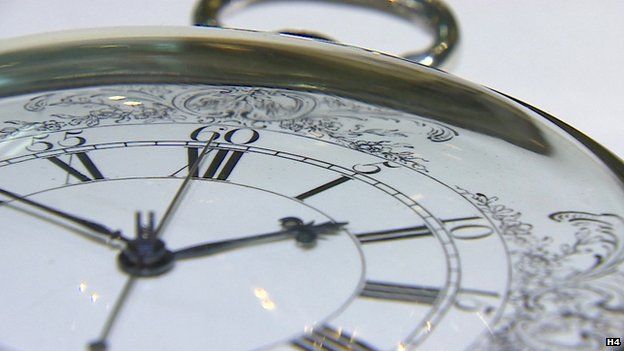Antibiotics to be focus of £10m Longitude prize
- Published

Antibiotic resistance has been selected as the focus for a £10m prize set up to tackle a major challenge of our time.
Six themes were initially identified by organisers of the Longitude Prize; these were then put to a public vote.
The winning theme was announced on the BBC's One Show, broadcast on Wednesday evening.
The World Health Organization (WHO) has warned of a "post-antibiotic era" where key drugs no longer work and people die from previously treatable infections.
The competition is based on the 1714 Longitude Prize won by John Harrison.
Harrison's clock allowed sailors to pinpoint their position at sea for the first time.
Speaking on the One Show, BBC science presenter Alice Roberts said: "There were some amazing challenges, but this is such an important one facing us at the moment.
"From here, the Longitude Committee will reconvene and they will tighten up exactly what the challenge is going to be. We know it's going to be something about how we tackle antibiotic resistance; it could be a new way of diagnosing a bacterial infection versus a viral infection.
BBC science presenter Alice Roberts announces the focus of the prize on the One Show
"They want to narrow down that challenge so we'll really know when someone has won it."
Dr Jeremy Farrar, director of medical research charity the Wellcome Trust, said he was "delighted" by the result.
"Antibiotics, and indeed the multitude of drugs used daily to treat infection, are the bedrock on which much of modern medicine is built.
"Yet rapidly emerging drug resistance threatens the medical successes - from transplant surgery to cancer treatment - we currently take for granted. It is crucial we focus our collective global research efforts on this, one of the greatest public health threats of our time."
Analysis
By James Gallagher, Health editor, BBC news online
In the war between bacteria and medicine, bacteria are winning. Drug resistant tuberculosis, gonorrhea and Klebsiella are popping up around the world.
Antibiotic resistance would not be a problem if there was a continuous supply of fresh antibiotics, but there has not been a new class of the drugs discovered since the 1980s.
It means there is a terrible future on the horizon - a world without antibiotics.
The World Health Organization has warned that "many common infections will no longer have a cure and, once again, could kill unabated".
Cutting open the body in surgery and cancer treatments, which weaken the immune system, will both be more deadly without antibiotics.
Reversing the tide of this war will be a huge challenge and worthy of a £10m prize.
Lord Martin Rees, chair of the Longitude Committee and Astronomer Royal, said he hoped the prize would "speed up progress towards meeting the challenge of resistance to antibiotics by stimulating invention and innovation - especially 'out of the box' thinking".
And the chief medical officer for England, Prof Dame Sally Davies - who has previously warned of the threat posed by resistance - said the development of a rapid diagnostic test would "help to conserve the antibiotics we have and thus ensure they remain effective for as long as possible".
The £10m prize fund has been offered by the innovation charity Nesta and the government-funded Technology Strategy Board.
The original £20,000 prize was set by the British government to solve the most vexing issue of the 18th Century: how to determine a ship's longitude at sea.
For sailors to pinpoint their position on the waves, two clocks were required: one that was set each day, using the the height of the sun in the sky, and another that kept the time back at port.
The problem with the latter was that the pitch and roll of the oceans, and the humidity and temperature changes at sea would damage the delicate mechanisms of a timepiece.
But Mr Harrison, a clockmaker from Yorkshire, created a chronometer that overcame these problems.
It took several prototypes and decades of battling with the scientific elite before he was finally deemed the winner. His work revolutionised navigation and saved countless lives.
The original six categories on which the public was asked to vote were:
- Flight - How can we fly without damaging the environment?
- Food - How can we ensure everyone has nutritious sustainable food?
- Antibiotics - How can we prevent the rise of resistance to antibiotics?
- Paralysis - How can we restore movement to those with paralysis?
- Water - How can we ensure everyone has access to safe and clean water?
- Dementia - How can we help people with dementia live independently for longer?
Follow Paul on Twitter.
- Published19 May 2014
- Published23 May 2014
- Published1 August 2013